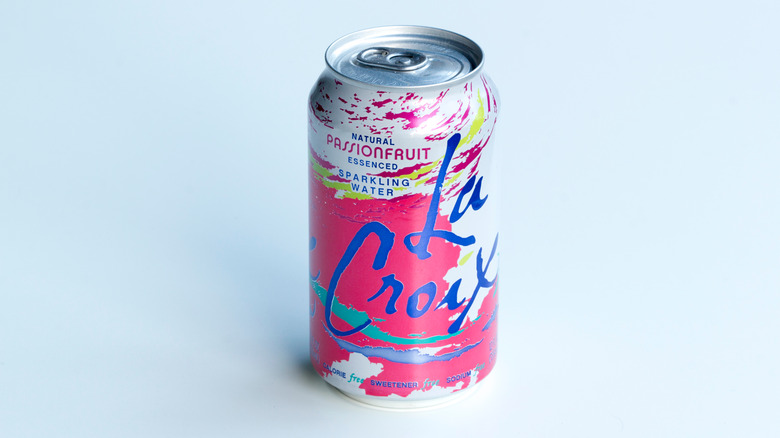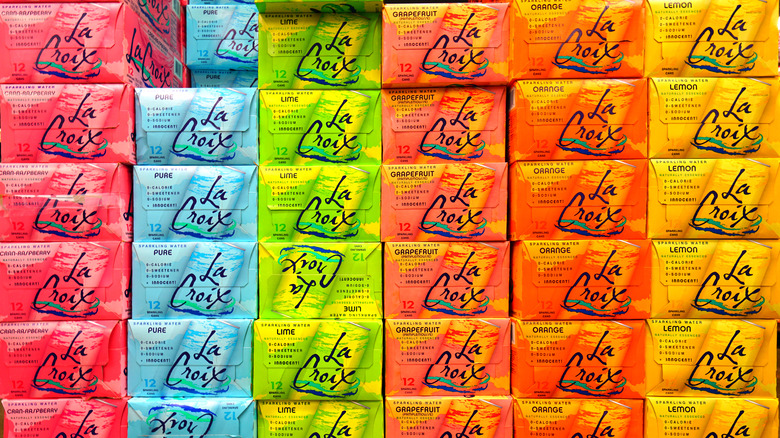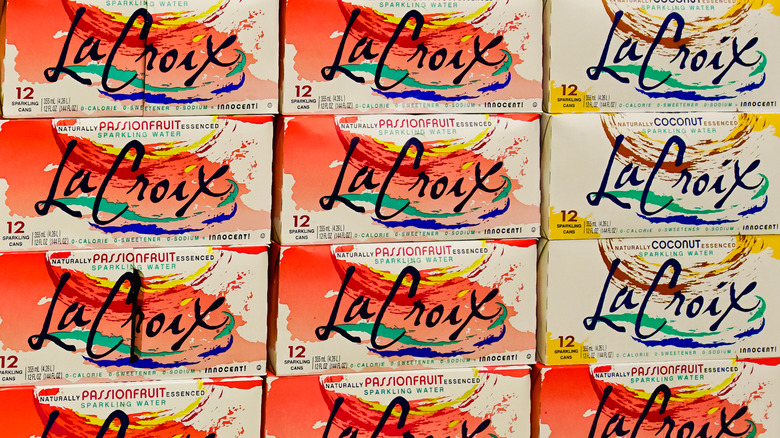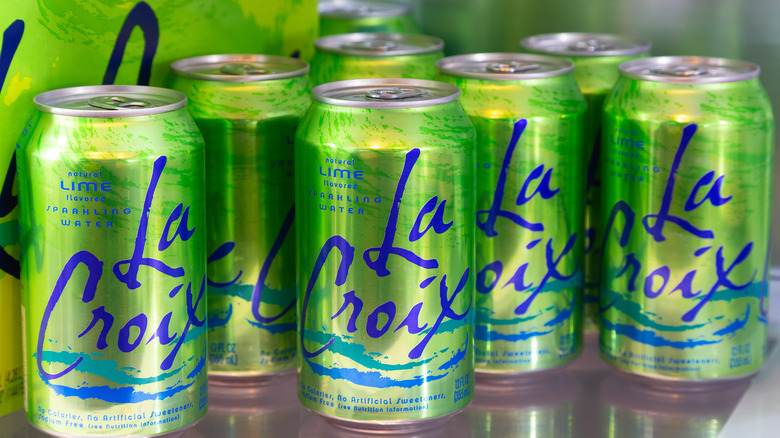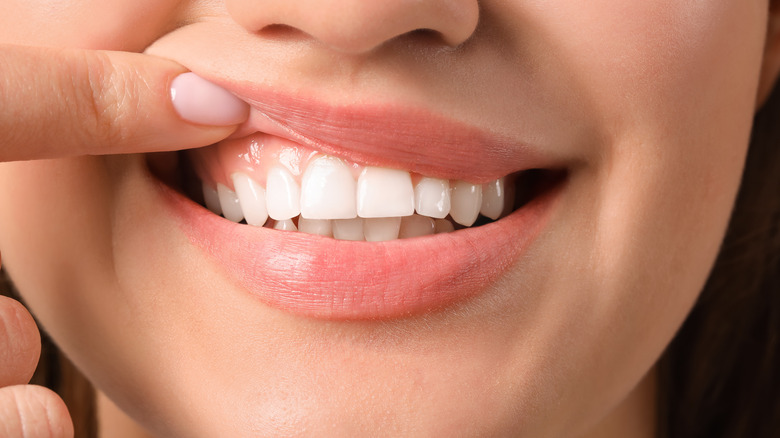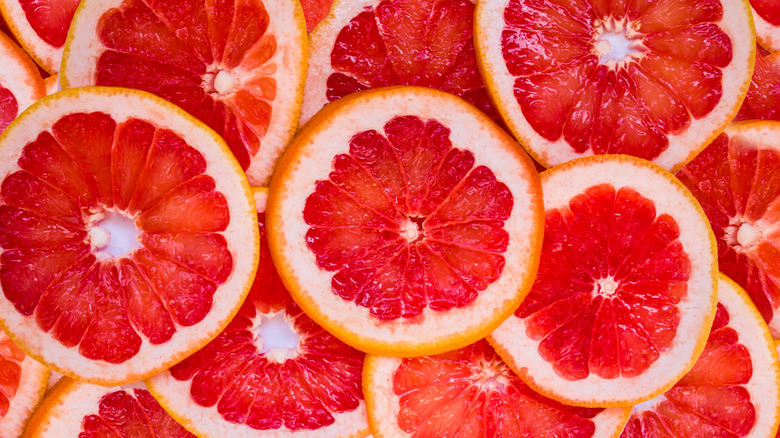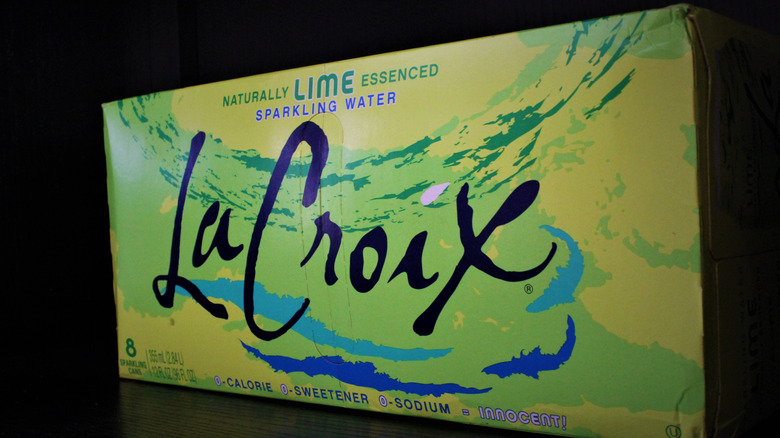Is La Croix Bad For You?
It feels like there's no stopping La Croix. While the ubiquitous sparkling water brand has been around since the 90s, in recent years it's become the drink of choice for millennials, who are as enamored with its refreshing, light taste as they are with its seriously cool packaging. And it feels like there's no stopping the drink from going from strength to strength: In 2021, sales of La Croix led its parent company, National Beverage Corp., to make a whopping $246 million in the third quarter of 2021, with the company saying that more and more people turned to La Croix as a flavored drink they could enjoy at home during the COVID-19 pandemic (per Vending Marketwatch).
But as the popularity of La Croix continues to grow, so do questions about actually how good it is for you. While La Croix contains little more than carbonated water and natural flavors, it's important to bear in mind that consuming even these, especially in higher quantities, may have some health implications. And here at Health Digest, we wanted to know exactly what these health implications were, and whether La Croix is, once and for all, bad for you or not.
What exactly is in La Croix?
La Croix is a brand of fruit-flavored sparkling water that contains no calories, sugars, sodium, or sweeteners (via Delish). The parent company of La Croix also claims that the beverage is all natural and naturally flavored. This claim was called into question in 2018, however, when a class action lawsuit alleged that the brand of sparkling water actually contains artificial ingredients.
While La Croix's website claims that the beverage's flavors are derived from "natural essence oils" extracted from fruit, the lawsuit against the company alleged that it contains chemicals that have been labeled as synthetic by the U.S. Food and Drug Administration (FDA).
According to a statement from Beaumont Costales, the law firm that filed the suit, "these chemicals include limonene, which can cause kidney toxicity and tumors; linalool propionate, which is used to treat cancer; and linalool, which is used in cockroach insecticide." Despite this, all three chemicals are generally considered safe by the FDA and NIH when used to flavor drinks.
La Croix doesn't have to share all of its ingredients
While a lawsuit alleging that La Croix's flavorings were synthetic was eventually dropped by the plaintiff, this doesn't mean that the suit had absolutely no basis (via Byrdie). Although La Croix is certainly a healthier option than soda, the beverage's natural and artificial flavors are still a bit of a mystery.
According to The New York Times, the government defines "natural flavors" as "those that derive their aroma or flavor chemicals from plant or animal sources, including fruit, meat, fish, spices, herbs, roots, leaves, buds or bark that are distilled, fermented or otherwise manipulated in a lab." But that said, there are some loopholes. "Even if, for example, a certain grapefruit flavor is extracted directly from grapefruits, companies can still mix in synthetic additives, like solvents, to make that flavor blend well with the other ingredients," registered dietitian Carolyn Brown told Byrdie. "The FDA calls these ingredients 'incidental additives.' And, thanks to a lack of policy governing their use, food makers are not required to disclose what they are or when they're in a product."
La Croix can help you stay hydrated
Regular, still water may be viewed as the gold standard for keeping on top of hydration. But if you're a lover of La Croix, you'll be pleased to hear that drinking it regularly will still help you maintain your hydration goals. La Croix and other sparkling waters will be just as hydrating for your body as drinking still water will, according to the Cleveland Clinic. And so for folks who find it difficult to get the necessary amount of water needed every day, La Croix could be the way to go.
In fact, choosing La Croix over regular water may result in some people improving their general hydration. Opting for sparkling water, which has a pleasant mouthfeel, might cause you to drink more water overall throughout the day, thereby making you more hydrated, Healthline says. On the other hand, a study published in PLoS One examined how drinking sparkling water affects thirst levels and found that the carbonation in sparkling drinks can cause people to feel less thirsty, thereby causing them to drink less overall. So just bear in mind that, if you're drinking La Croix in place of still water, you may be thirstier than you think.
How La Croix might affect your dental health
With the endless horror stories of soda habits completely ruining teeth (via Healthline), it's little surprise that you might have concerns about what La Croix may do to your dental health. After all, it's a fizzy, flavored drink ... Surely not a recipe for success, right?
Well, as it turns out, La Croix may be less impactful on your dental health than you think. When it comes to tooth health and your tooth enamel specifically, there's little difference at all between drinking sparkling water and regular water, says the American Dental Association (ADA), despite sparkling water being marginally more acidic. The thing that really affects your teeth in most carbonated beverages is the sugar content, which ushers in increased bacteria production, which then eats through your enamel and creates cavities (per Colgate). And per their website, La Croix beverages are sugar-free.
One area where you do have to be careful with your La Croix intake, though, is if you're drinking a lot of citrus flavors. The ADA notes that beverages with citrus flavors like lemon and lime will have a higher acidity than drinks with other flavors, and this acid could end up damaging your enamel. Try to keep your taste for citrus flavors low, and if you do opt for them, try and consume them alongside a meal so your teeth aren't getting an acid bath.
You should probably stick to regular water when exercising
Staying hydrated when exercising is vital. If we don't keep on top of our water intake and replace fluids lost when we work out, we quickly become dehydrated, leaving us with less energy and resulting in our muscles taking longer to recover (per Bupa). And if you love La Croix, you might take this as a sign to pack an extra can or two into your gym bag — but we'd recommend sticking to still water, for a few reasons.
The first of these is due to the effect of the gas on your stomach, and your perception of how thirsty you are. When you drink sparkling water, your stomach not only takes on water but air, making you feel more full. When this happens, it's easy to believe that you've drunk enough water and are no longer thirsty, and this "could prevent you from hydrating as much as your body needs," according to B Nutritious founder and certified dietitian nutritionist Brooke Alpert via Aaptiv. There's also the fact that this additional gas can cause you to feel bloated, which can be a total nightmare if you're trying to get through a hard workout, particularly if you have a digestion condition like irritable bowel syndrome. In short, while that La Croix can may look cool at the gym, a regular bottle of water is far better.
Can the Pamplemousse La Croix interact with your medication?
Take one look at a shelf stocked with La Croix, and you'll see an almost dizzying range of flavors. One of them, Pamplemousse, might be especially appealing for folks who like the tart flavor of grapefruit — but if you're taking certain medications, it's important to be aware of the risks. Pamplemousse La Croix is made with "pure grapefruit oil," according to the La Croix website. And certain substances in grapefruit can decrease the body's capacity to process and filter out medication, which leads to drugs becoming more potent in your system, staying in it longer with potentially dangerous consequences (per the FDA). In other cases, grapefruit may block drugs from working to their full potential.
Drugs that treat common conditions like high blood pressure, anxiety, allergies, and cholesterol can all be affected by ingesting grapefruit or grapefruit juice. So what about La Croix? While the website doesn't exactly state whether it may affect any drugs you're currently on, the inclusion of a grapefruit extract might cause people taking regular medication to think twice about buying a case. La Croix advises you to talk to your doctor if you have any concerns or problems regarding your medication.
Drinking La Croix could make you hungrier
For a lot of people, La Croix is the perfect thing to drink between meals, offering a punch of flavor to keep your mouth entertained when you're a few hours from lunch. But could that can in your hand be causing you to have to eat your lunch sooner? A study published in Obesity Research & Clinical Practice suggests it might. The study examined the effects of drinking sparkling water on the release of ghrelin, or the "hunger hormone." The study found that people who drank sparkling water had six times the amount of ghrelin in their bloodstream as folks who stuck to regular still water, implying that the carbon dioxide in the drink could make you hungrier.
However, the research isn't conclusive. "The study didn't account for external factors that could have influenced weight gain such as an unhealthy diet or lack of exercise," according to registered dietitian Tracy Lockwood Beckerman via My Fitness Pal. What Beckerman also says, however, is that when people drink beverages like La Croix, which contain natural flavorings without any sugar, it can sometimes cause further cravings for sweet treats and potentially lead people to eat more overall. So, while La Croix may be healthier than drinking super-sugary carbonated drinks, it might be worth keeping an eye on what your intake is doing to the rest of your diet.
La Croix could improve your digestion
A can of La Croix won't just keep your tastebuds happy, it'll likely keep your digestive system happy too. The first place it's helpful is where your food enters your body itself: According to research published in the journal Dysphagia, drinking sparkling water was shown to increase the ability to swallow in both younger and older individuals. This improvement in swallowing ability has not only implications for people who find it difficult to do so in the first place, but for general digestive health and ease of swallowing in all people.
And as for where your food exits your body? Well, La Croix can help there too, folks. (Okay, sorry for the fairly vivid imagery there, but just go with us). A further study, published in the Journal of Korean Academy of Nursing, examined the effects of sparkling water on constipation. It was found that, for the people drinking sparkling water, constipation was almost 60% less prevalent. The frequency of bowel movements also almost doubled in the people who were drinking sparkling water instead of regular still water, pointing toward the carbonated beverage's ability to get things moving.
Should you consume La Croix in moderation?
It's all too easy to bust open a case of La Croix and be through the whole thing before you know it. But how much should you actually be drinking? Well, while La Croix is probably going to be better to drink regularly than a sugar-packed soda or a drink filled with artificial sweeteners, it's not without its question marks. The first issue occurs with what exactly is in the "natural flavors" that go into La Croix. While "natural flavors" is a trendy marketing term, the definition of this term isn't strict and is open to broad interpretation, says Healthline. So, it's unclear what ingredients might go into "natural flavors," making it difficult to discern that you're actually drinking. There's also the carbonation of La Croix to consider, which may cause you to have additional gas and bloating, and may prove troublesome for your teeth if you're regularly drinking citrus flavors.
On the other hand, La Croix is essentially just carbonated water and flavorings, so if you're switching to it from soda, it's not the worst idea in the world. So how much should you drink? Consuming one or two cans of sparking water a day should be totally fine, according to gastroenterologist Yezaz Ghouri via Good Housekeeping. And if you're looking for an alternative to La Croix that may be even healthier, try Spindrift, a flavored sparkling water with the only additive being fruit juice.

